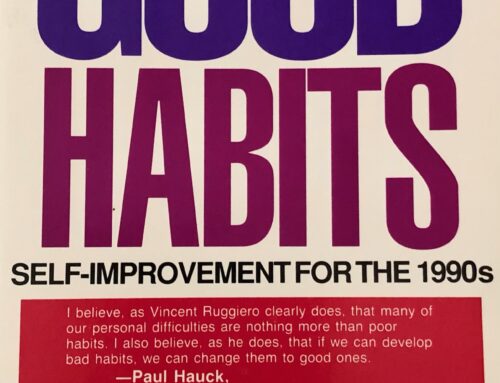This essay is part 2 of “Living Wisely in a Foolish World.”
It’s pleasant to regard ourselves as individuals from birth, having formed our own ideas, attitudes, perspectives, preferences, likes and dislikes, and so on, completely uninfluenced by others. Pleasant, but mistaken! We were receiving influences by hearing and touch even before birth, and influences by sight soon after birth, in both instances long before we were able to process them. Our reactions to people, places, foods, music, art, stories, beliefs, values, and habits were shaped by our encounters and experiences long before we were able to understand them, let alone engage in reasoning about them.
Simply said, pretending we are completely individual is a delusion. If we possess genuine individuality at all, it is only by examining what life has presented us and deciding whether what to keep or change. Here is how that is done:
Examine your Beliefs
About Religion. Are you a believer? If so, in what religion—Christianity? Judaism? Islam? If your response is “I was raised in one faith, but I no longer practice it,” what made you change, and even more important, what did you change to? Are you an agnostic or an atheist? Don’t stop there. There are several different types of each, so what type are you? (If you aren’t sure, look up the various kinds and decide which best describes you.)
About right and wrong. You might be tempted to respond, “I believe everyone should decide for him/herself what is right and wrong.” But that is an empty answer. The question is what you believe. What behaviors do you believe are wrong and what specifically is wrong about them? Also, do you believe in responsibility to others? If so, to whom and why?
About Politics. What political party do you belong to? What about that party fits your view of effective government? (If your answer is “I am an Independent,” explain in what ways the other parties are unacceptable to you.) Have you voted in recent elections? If not, why not?
About social issues. Where do you get your information about social issues? If your answer is a particular newspaper or television network, what has made you choose that source? Most people choose their source because they share its social philosophy. Where did you get your social philosophy? Have you ever wondered if your source is reporting accurately and honestly, or do you simply assume that it is? If you have wondered, did you ever compare its news stories with sources that have a different perspective? If not, why not?
Now the harder part. Look back at your answers to the above questions and identify the influences that led you to each belief. Once you identify them you will be able to decide whether they are positive or negative and whether to maintain or abandon them.
Examine your Attitudes and Emotions
It is possible to have strong attitudes and feelings about individuals and groups we have never met. In such cases, our reactions come from something we heard or have been told. The results are vulnerability to manipulation and the unfair habit of prejudging others. To avoid both, we need to be aware of our attitudes and feelings and determine whether we have any real basis for them. Consider, for example, your reaction to each of the following:
Catholics, Evangelicals, Jews, atheists
Caucasians, African Americans, Hispanics, Asians
Germans, Poles, Russians, Arabs
Democrats, Republicans, Socialists, Communists
Next, examine each of your reactions, positive or negative, and decide what it is based on. For example, you may know one member of the group, or many members, or no member at all but have merely heard comments about the group.
Finally, in each case, consider whether your knowledge is sufficient to support your attitude toward the entire group. As you are making this determination, don’t be surprised if you have little basis for your view but nevertheless feel strongly about maintaining it. The most sensible response to that feeling is to visit one or more unbiased sources and then reevaluate your view.
Examine your Reaction to Disagreement
Many years ago, I saw a memorable magazine cartoon. A man and woman were seated across a restaurant table. With an angry look on his face, he was saying . . . “The reason I’m raising my voice is that I’m WRONG.” The humor lay in the unexpectedness of the admission. One of the hallmarks of our humanity is our difficulty to admit we might possibly be wrong. We tend to fume and sometimes raise our voices at the very idea.
Sadly, it’s a rare person who regards disagreements with others as opportunities for expanding his or her knowledge. It seems that more and more people see those who disagree with them as enemies who endanger their self-esteem. That is why they regard changing their minds as dishonorable when it is actually more often the mark of integrity and the prelude to knowledge and wisdom.
The next time someone disagrees with something you said and your first thought is, “How dare this person challenge my idea?” think instead, “Well, I could be wrong, so I’ll listen carefully and consider whether the person is partly or wholly right.” Not only will the conversation that follows be more meaningful; you will also have demonstrated respect for others and put understanding above egotism.
Copyright © 2024 by Vincent Ryan Ruggiero. All rights reserved.




